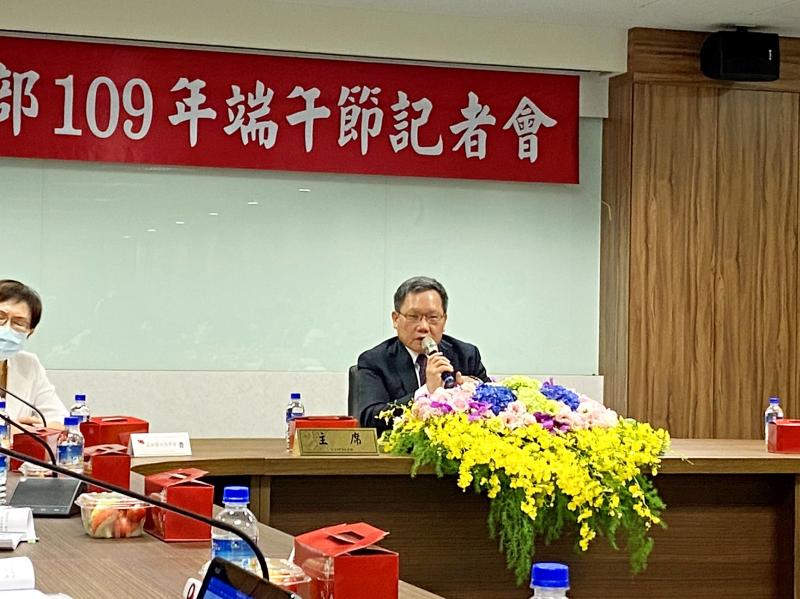The Ministry of Finance yesterday said it would ask state-run banks to offer loans totaling NT$1 trillion (US$33.67 billion) to help local firms upgrade and transform in the post-pandemic era.
The ministry would act as an integrator in facilitating the loans that might be available for a year after the COVID-19 outbreak has stabilized, Minister of Finance Su Jain-rong (蘇建榮) told a media briefing.
The government is mobilizing resources to help local firms recover from the virus shock and grow stronger on the world stage, Su said.

Photo: Wu Chi-lun, Taipei Times
State-run lenders would be asked to offer loans totaling NT$1 trillion at preferential interest rates, capped at 2 percent on top of benchmark policy rates, he said.
That means borrowing costs would stand at 2.81 percent, much lower than an average of 4 percent for loans to small and medium-sized enterprises, Su said.
The funds are intended to support companies that plan to innovate, transform, upgrade and deploy in overseas markets.
Furthermore, venture capital units of state-run financial institutions are encouraged to take the initiative and join forces with private partners in funding promising ventures, he said.
“State-run financial institutions are to take up the role of a locomotive and supply fuel for corporate investment in the post-pandemic era,” Su said.
The six state-run venture capital companies can together come up with NT$10 billion for such moves, he said.
The ministry would lend support to the campaign by providing tax credits, lower tax refund thresholds, friendly tariffs and other incentives, Su said.
The virus outbreak and US-China trade tensions make global supply chain realignment necessary and local firms are weighing upgrade and transformation options to stay in business, he said.
The ministry would continue to assist Taiwanese firms returning from overseas markets and provide incentives for capital repatriation, he added.
The pace of capital repatriation has so far lagged behind government expectations, with only NT$10.55 billion repatriated over the past 10 months, compared with an estimate of NT$133.3 billion annually under a conservative scenario, Su said.
“The figures suggest much room for improvement,” he said.
Su said that the National Stabilization Fund’s steering committee would meet on July 15 to discuss whether to exit the local bourse now that the TAIEX has recovered almost all of the losses it suffered due to the pandemic.
Su declined to speculate on the fund’s movements, saying that the committee would have the final say following a consensus ruling.
Foreign institutional players have mostly rejoined the local market as evidenced by the rallies in the TAIEX and a stronger local currency, he said.

South Korea’s equity benchmark yesterday crossed a new milestone just a month after surpassing the once-unthinkable 5,000 mark as surging global memory demand powers the country’s biggest chipmakers. The KOSPI advanced as much as 2.6 percent to a record 6,123, with Samsung Electronics Co and SK Hynix Inc each gaining more than 2 percent. With the benchmark now up 45 percent this year, South Korea’s stock market capitalization has also moved past France’s, following last month’s overtaking of Germany’s. Long overlooked by foreign funds, despite being undervalued, South Korean stocks have now emerged as clear winners in the global market. The so-called “artificial intelligence

NEW IDENTITY: Known for its software, India has expanded into hardware, with its semiconductor industry growing from US$38bn in 2023 to US$45bn to US$50bn India on Saturday inaugurated its first semiconductor assembly and test facility, a milestone in the government’s push to reduce dependence on foreign chipmakers and stake a claim in a sector dominated by China. Indian Prime Minister Narendra Modi opened US firm Micron Technology Inc’s semiconductor assembly, test and packaging unit in his home state of Gujarat, hailing the “dawn of a new era” for India’s technology ambitions. “When young Indians look back in the future, they will see this decade as the turning point in our tech future,” Modi told the event, which was broadcast on his YouTube channel. The plant would convert

‘SEISMIC SHIFT’: The researcher forecast there would be about 1.1 billion mobile shipments this year, down from 1.26 billion the prior year and erasing years of gains The global smartphone market is expected to contract 12.9 percent this year due to the unprecedented memorychip shortage, marking “a crisis like no other,” researcher International Data Corp (IDC) said. The new forecast, a dramatic revision down from earlier estimates, gives the latest accounting of the ongoing memory crunch that is affecting every corner of the electronics industry. The demand for advanced memory to power artificial intelligence (AI) tasks has drained global supply until well into next year and jeopardizes the business model of many smartphone makers. IDC forecast about 1.1 billion mobile shipments this year, down from 1.26 billion the prior

People stand in a Pokemon store in Tokyo on Thursday. One of the world highest-grossing franchises is celebrated its 30th anniversary yesterday.